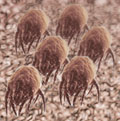Symptoms of Dust Mite Exposure

Dust mites do not burrow under your skin, bite or spread disease. In fact, unless you are allergic to them (their shedded skin or waste) you wonít even know there are there. However, many people are allergic.
If you feel you may be one of those people, see your doctor for an allergy test. Dust mites are the one of the major causes of asthma and allergy reactions.
Dust mites, allergies and asthma
How does the dust mite cause allergies and asthma? As we mentioned, it is their droppings and shedding/decaying skin that you are allergic to. So, the dust mite lays a dropping (up to 30 every day). The dropping is then breathed into your lungs.
Itís not that difficult to imagine considering that many of these droppings are in your bed and on your favorite chair. The allergen in the dropping destroys the cells protecting the lungs. The cell dies and that leaves the opening for the allergens to have access to your entire body.
Some of the basic symptoms of dust mite allergies are:
- sneezing
- runny or stuffy nose
- watery eyes
- itching
- eczema
- stuffy ears
- respiratory problems
- rash
- asthma attacks with lung congestion, shortness of breath and wheezing
Generally, even those who are allergic to dust mites only have a reaction when they are cleaning or otherwise stirring up the dust in their homes.
If you are sensitive the dust mites then you need to take steps to significantly reduce the mite population in your home. Dust Mite Control
